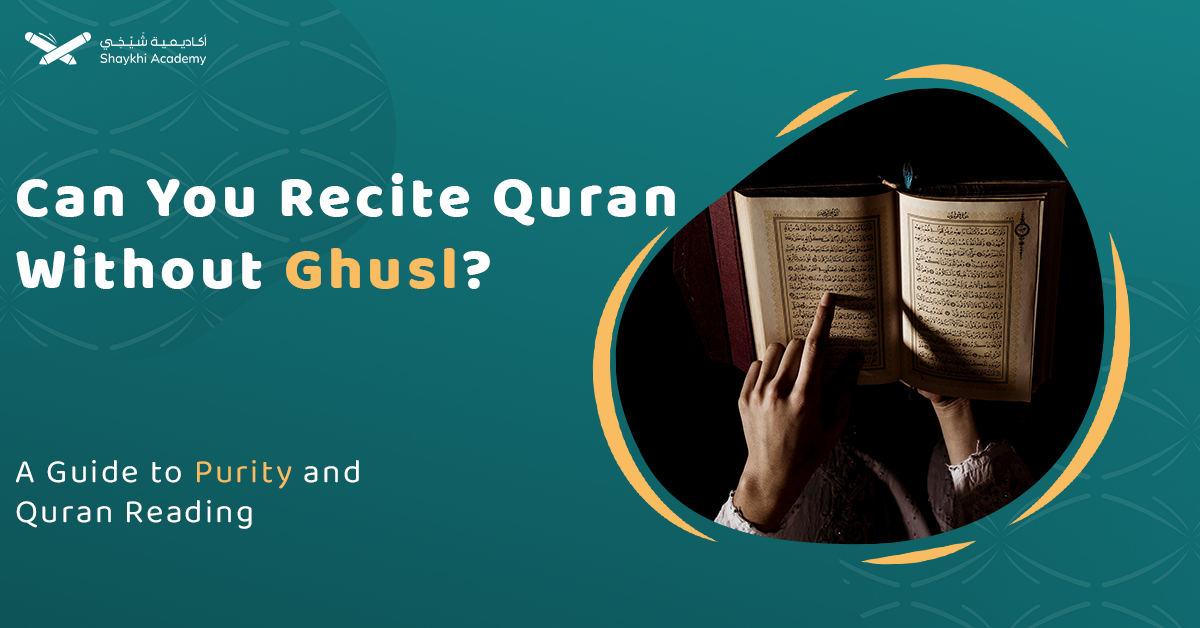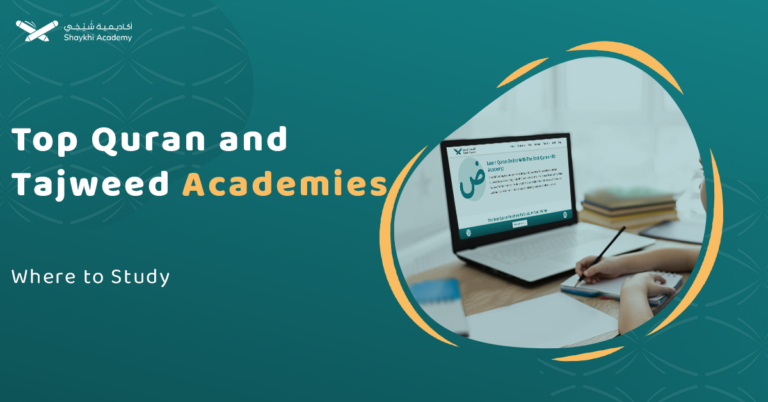The Holy Quran recitation is one of the virtuous worships, it is the best of all remembrance of Allah. There are rulings, conditions, and etiquette that must be well known before reciting the Holy Quran. A question that is relevant to this topic is: “Can I read the Quran without Ghusl?”
In this article, we will answer this question and cast some light on Al-Ghusl “purification” and investigate whether fulfilling ghusl is a mandatory act for reciting the Holy Quran or a must for touching the book of the Holy Quran “Al-Mushaf Ash-sharif”, drawing upon insights evidence from the holy Quran and prophetic reports “As-Sunnah An-Nabawiyyah” to present a clear vision about this doctrinal topic.
Defining the Concept of Ghusl and How It Relates to Reciting the Quran
Al-Ghusl “Purification” is a cardinal percept among the Islamic beliefs, this concept encompasses both spiritual and physical cleansing.
Each Muslim or Muslimah has to accomplish a comprehensive state of purity, named as “Ruling of at-Taharah” before he or she engages in any acts of worship such as performing salwat (prayer), or reciting the Holy Quran. Therefore, upholding the rulings of purity is an essential matter from the Islamic perspective.
In accordance with the foregoing, ghusl is a cleaning act that requires washing someone’s whole body to purify their bodies and souls from a barrier that happened to them. Ghusl is performed in specific obligatory cases as explored below.
A. Obligation Cases for Ghusl
Here are the mandatory cases that obligate someone to do ghusl:
1. Sexual Intercourse:
It is a must for every man or woman to do ghusl if they are involved in a sexual intercourse.
2. After Menstruation Period
It is a must for every woman after the end of her menstruation days to perform ghusl.
3. Puerperium
It is a must for every woman who gives birth to do ghusl after 40 days.
4. Sexual Wet Dreams
It is a must to do ghusl if semen is emitted. Visit the page of Shaykhi Academy’s Islamic Studies Online Course for more details about this point.
Can You Recite the Quran Without Ghusl?
No, you can’t read or recite the Holy Quran without fulfilling the ghusl while in the state of Janabah or female-period. You neither can read from Al-Mushaf nor you can read from your memory.
Scholars stated that it can be allowed to read just a few verses from one’s memory in the case of necessity such as fear or to ask for refuge from Satan. If you have major impurities “Janabah, Menstruation, Puerperium…etc”, then you have to perform ghusl before reciting or touching the book of Quran.
The evidence is that Ali ibn Abi Talib narrated: “Allah’s Messenger would recite the Quran in all conditions, as long as he was not Junub” Jami` at-Tirmidhi. Book 1, Hadith146
Can Women Recite the Quran in Period?
The majority of Islamic jurists stated that women cannot read the Holy Quran from memory or from Al-Mushaf Ash-sharif during their monthly period until they get purified. However, some jurists stated that it is permissible for women in their menstruation period to recite the Quran only from their memories.
The scholars built their opinion on the fact that there’s a difference between the one who is in Janabah and the woman who is in her messes. The one who is in Janabah has the ability to remove this Janabah by making ghusl at any time, unlike the menstruating woman who has to wait until her menstruation days end.
As for reading from Al-Mushaf Ash-sharif or touching the book of the Holy Quran during menses, scholars stated that it is banned for women to touch Al-Mushaf during their menses period or during any other kind of major impurity which includes menstruation, puerperium and Janabah (sexual intercourse or sexual wet dreams which results in cums)
What Should I Do If Water is Not Available for Ghusl?
Allah the Almighty said in the Holy Quran, “If you had intercourse, then purify yourselves. If you are ill, or travelling, or one of you returns from the toilet, or you had contact with women, and could not find water, then use some clean sand and wipe your faces and hands with it. God does not intend to burden you, but He intends to purify you, and to complete His blessing upon you, that you may be thankful.” Surah al-Ma’idah, Verse 6.
“وَإِنْ كُنْتُمْ جُنُبًا فَاطَّهَّرُوا ۚ وَإِنْ كُنْتُمْ مَرْضَىٰ أَوْ عَلَىٰ سَفَرٍ أَوْ جَاءَ أَحَدٌ مِنْكُمْ مِنَ الْغَائِطِ أَوْ لَامَسْتُمُ النِّسَاءَ فَلَمْ تَجِدُوا مَاءً فَتَيَمَّمُوا صَعِيدًا طَيِّبًا فَامْسَحُوا بِوُجُوهِكُمْ وَأَيْدِيكُمْ مِنْهُ ۚ مَا يُرِيدُ اللَّهُ لِيَجْعَلَ عَلَيْكُمْ مِنْ حَرَجٍ وَلَٰكِنْ يُرِيدُ لِيُطَهِّرَكُمْ وَلِيُتِمَّ نِعْمَتَهُ عَلَيْكُمْ لَعَلَّكُمْ تَشْكُرُونَ”.
In the absence of water, you can do an alternative act, which is called Tayammum. It is an Islamic ritual mentioned in the above Quranic verse. It is to use some clean sand or a clean soil to wipe your faces and hands with it. After you perform Tayammum, you have to perform Ghusl whenever water is available.
Important note: Tayammum is allowed in two cases: non-availability of water or inability of use because of someone’s illness.
Is Washing Before Reading the Quran a Must?
No, it isn’t. Washing or fulfilling ablution “Wudu” is not a mandatory condition that must have been done before reading the Holy Quran from the memory or by using an electronic device. But if someone intends to read from Al-Mushaf Ash-sharif, it is desirable to perform wudu before doing that. Visit the page of Shaykhi Academy’s Islamic Studies Online Course for more details about this point.
Was Ghusl Mentioned in the Holy Quran?
Allah the Most Exalted says in the Holy Quran: “O you who believe! Do not approach the prayer while you are drunk, so that you know what you say; nor after sexual orgasm—unless you are travelling—until you have bathed.” Surah an-Nisa. Verse 43.
“يَا أَيُّهَا الَّذِينَ آمَنُوا لَا تَقْرَبُوا الصَّلَاةَ وَأَنْتُمْ سُكَارَىٰ حَتَّىٰ تَعْلَمُوا مَا تَقُولُونَ وَلَا جُنُبًا إِلَّا عَابِرِي سَبِيلٍ حَتَّىٰ تَغْتَسِلُوا ۚ”
The word” bathed” in the above Quranic verse means to perform ghusl, accordingly, the term “Ghusl” was mentioned in the Holy Quran as has been stated above.
How Can I Perform Ghusl?
You must let water touch each part of your entire body, including your hair. You can perform your ghusl as mentioned in the following valid Hadith: Aa’ishah said: When the Messenger of Allah:
(peace and blessings of Allah be upon him) did ghusl from janabah, he would start by washing his two hands, then he would pour water into his left hand with his right hand and wash his private part, then do wudu’ as for prayer, then he would take the water and, using his fingers, make it reach the roots of his hair, until he was certain that the water had reached the roots of his hair, then he would pour three scoops of water over his head, then he would pour water over the rest of his body, then he would wash his feet.”
Narrated by Muslim, 474.
Can I Listen to the Holy Quran Without Ghusl?
Yes, you can listen to the Holy Quran while you are in the state of Janabah or any item of major impurity. It is allowed to do that as there is no lawful impediment to such a restriction.
Difference Between Ghusl and Washing / their Implications for Reciting the Quran
Briefly: Ghusl is a ritual of purification. It is a must for every Muslim or Muslimah to be purified from “Janabah” which is considered one of the major impurities. Janabah means involving in a sexual intercourse or having sexual wet dreams that results in a seminal liquid. Menstruation and puerperium are two additional cases that oblige women to do ghusl.
Whereas, washing is to perform ablution “wudu” or to wash your body with water without there being a jurisprudential necessity (Janabah, menstruation puerperium…etc) for doing so.
1. Ghusl is for Major Impurity
Ghusl is performed to remove and purify the major impurity (Janabah, Menstruation, Puerperium, Wet dreams). Ghusl is a must before touching Allah’s Book “Al-Mushaf Ash-sharif”. In other words, those who touch Allah’s book while they are in one of the major impurities are sinners. But it is permissible for them to just silently recite the Holy Quran from their minds without using or touching Al-Mushaf Ash-sharif.
2. Washing is for Minor Impurity
Washing is performed to remove and purify the minor impurity such as urination, bowel movements, defecating or taking a whiz. It can also be done without any mandatory reasons or conditions for doing it. Washing is not a must for reciting the Holy Quran from one’s memory but it is desirable to do it before reading the Holy Quran from Allah’s book, “Al-Mushaf Ash-sharif”.
Read more about: Can You Recite the Quran Without Wudu?
Start Your Worthwhile Journey of Learning Islam
Shaykhi Academy presents large sets of enhanced knowledge and information about the affluence and abundance of the Islamic doctrinal issues.
Shaykhi Academy’s Islamic Studies Online Course is a unique course for all learners. The course covers many essential tips about ghusl and all the other kinds of the major impurities. It also deals with additional thoughts and points of view.
Shaykhi Academy’s all-inclusive lessons present immersive Islamic knowledge tailored professionally to benefit all learners.
Shaykhi Academy’s Islamic Studies Online Course is taught under the auspices of the experienced tutors Dr. Mahmoud AlAssal and Sh. Luqman ElKasabany.
All the teaching staff of Shaykhi Academy graduated from Al-azhr Ash-sharif University. They had wonderful experiences in the Islamic studies field. It is an essential matter to be taught under the aegis of such quality.
Why Choose Shaykhi Academy?
- Connect with highly qualified native tutors.
- Flexible scheduling to suit your busy lifestyle.
- Affordable classes tailored for all levels.
- Accessible from anywhere around the globe.
Discover Our Range of Courses:
- Arabic Noorani Qaida: Lay a solid foundation for Quranic studies.
- Online Quran Classes for Kids: Engaging lessons for lifelong learning.
- Tajweed Rules for Kids: Learn to recite with confidence.
- Quran Hifz for Kids: Step-by-step guidance to memorize the Quran.
- Quran for Adults: Introduce yourself to Quran reading and Tajweed rules.
- Online Arabic Courses: Master the language of the Quran.
- Islamic Studies: A wide range of topics related to Islam, including theology, law, Quranic studies, Hadith.
Don’t Miss Out on Your Chance to Excel!Whether you’re a beginner or seeking advanced knowledge, Shaykhi Academy can guide you! Book your free trial now!

Conclusion
The sum up is that reading the Holy Quran without fulfilling ghusl is banned. It’s only allowed for a few cases under specific conditions.
A steadfast grasp of the answers to any arising questions or inquiries makes each Muslim and Muslimah stand on solid ground and form sound Islamic beliefs and habits. It guards them from any intellectual claims as well.

















































